Europe And Ukraine After Biden And Under The Trump Effect
Long before the first Tuesday of November, Europe had long been living in nervous anticipation of the outcome of the most important election of 2024: the US presidential election. I have repeatedly heard diametrically opposed assessments from my European colleagues, some of whom were deeply concerned, while others, on the contrary, were sincerely hopeful.
No campaign in the world has ever attracted as much interest as this year’s one in the United States. In the wake of Russia’s bloodthirsty challenge to Ukraine, outgoing President Joe Biden has been trying to do his utmost to consolidate a united Europe. The seemingly engaged approach of the Democratic US administration to its European allies, based on the defense of common values, has paid off. Today’s Europe is indeed more united, consolidated and determined.
However, will the Europe of Biden’s time be able to cope with the Trump effect and the challenges associated with the future Republican administration of the United States? And not so much cope with the challenges as turn them into opportunities? The world is entering 2025 with these questions.
Throughout the election campaign, President-elect Donald Trump did not mince his words and immediately warned of his future intentions. Once he is elected, the United Europe will have to deal with the leader of the Free World, who demands determination and self-sufficiency from allies and partners. As well as strict loyalty to the American leader.
He will be happy to lend his election slogan “America First” to others, with the understanding that their own interests will be as important to them as those of the United States. With this approach, it is fair to say that the period of value-oriented politics is over, and that on the twentieth day of January 2025 it will be replaced by a period of the primacy of interests.
The diplomacy of emotions, which Kyiv has been practicing in recent years, will lose its magical power because in the new realities it will not even get in the way – it will be irritatating. Only those who can convincingly get their “interest” across without emotion will have a chance to win, at least in the competition for the attention and support of the US president. This competition is as much about the United Europe as it is about each individual capital in the EU and beyond. Including, of course, Ukraine. No matter how horrifying the photos from Bucha or the video of the torture of prisoners may be, their psychological effect on the US administration is offset by a pragmatic and cynical assessment of the benefits it stands to gain.
“Dealing with the European Union was one of the most unpleasant tasks during my tenure,” said Mike Pompeo, former Secretary of State during the Trump presidency, when describing his acquaintance with Brussels. The other side, i.e., the European one, during Trump’s first tenure, perceived relations with the United States as no less unpleasant.
With a certain degree of probability, we can expect that in 2025, the story that seemed to be a thing of yesteryear in 2020, when the 45th president lost to the 46th head of the White House, will begin anew. The EU will again have to face Trump and his public categorical accusations against transatlantic friends of abusing the USa capabilities solely for their own benefit. This poses a challenge for the new President of the European Council, Antonio Costa, and for the President of the European Commission, Ursula von der Leyen, who already has her own experience with Trump, and for the new EU foreign policy chief, Kaja Kallas, who has yet to acquire this experience. In this respect, common sense will undoubtedly have to be found on both sides in order to exert efforts to strengthen and forge a mutually beneficial partnership, rather than to destroy it. Not only the health and strength of the transatlantic partnership and the Free World depend on this; Ukraine’s affairs do too.
NATO will also face difficult challenges in 2025. No wonder Donald Trump, both during the pre-election campaign and after his election, promoted the idea of Europe’s greater responsibility for its own security.
That being said, Donald Trump’s turn of phrase “there is an ocean between us” should not be taken as a hint of Washington’s unequivocal intentions to withdraw from NATO. This is a long-standing discussion within the alliance itself, which was provoked by the newly elected US president during his first term, including individual contributions from allies at a level of at least 2% of GDP for defense. This figure is now a thing of the past, as most NATO member states are not only not refusing, but are ready and paying the appropriate contributions. In this context, the ability of the alliance to agree on a defense spending ceiling of 3% by 2030 at the next NATO Summit in The Hague will be crucial in 2025. This ambition has already been announced by the new Secretary General of the Alliance, Mark Rutte.
But even this increased figure is unlikely to satisfy Trump. From now on, his demands will most probably be related to the ability of European allies to take care of their security on their own, rather than constantly relying on US resources and involvement.
No wonder that the European Union has seen lively discussions on ways to strengthen the security resilience and military capabilities of a United Europe. The report on strengthening the EU’s security preparedness and resilience drew up in October 2024 by former Finnish President Sauli Niinistö at the request of the EC President and the creation of a new position within the European Commission — the EU Commissioner for Defense — brought the issue of the EU’s rethinking of its own security into the practical plane. According to EU Commissioner for Defense Andrius Kubilius, EU countries should invest about €500 billion over the next decade in their own rearmament to meet current threats, in particular from Russia and its allies. The resolve of the EU in this matter will be evidenced by the decisions of its member states to accumulate these resources for security needs.
However, this issue is not just about money. As was recognized during Donald Trump’s first term, it is one thing (for Europe) to pay and it is quite another to be ready to send your people to the frontline.
French President Emmanuel Macron’s initiative to potentially send an international peacekeeping contingent of a “coalition of the willing” to Ukraine is exactly that. We are entering 2025 on the wave of another attempt to lobby for this issue with Macron as a leader. Regardless of what the results of the first conversations are — in Poland or at the December meeting of the European Council — the demand for “more Europe” in addressing security challenges on the European continent will be there to stay and will become louder. This is essence of the Trump effect.
Ukraine can be helpful in this matter and become not only a catalyst for change but also part of the solution. Ukraine is able to add to Europe what it has always lacked: self-sufficiency in security and military determination.
Next year, the issue of internal cohesion in the EU will also assume new colors. The new leadership of the EU institutions will strive to make full use of their first year in office to realize their goals. We should expect difficult discussions between the majority and those who until recently were considered marginalized.
Hungary and its longtime leader, Viktor Orban, are confidently holding the lead here. The Trump effect will have a positive impact on Budapest’s position within the EU, and its voice will gain much more clout. Let us immediately disappoint those who see this as a sign of betrayal. The new American administration will be guided by completely different approaches, where interests will take precedence. And if in this case Budapest is constantly blamed for the human rights situation and lectured, the most likely development will be the Kremlin’s use of Hungarian discontent against the interests of Europe itself. The year 2025 will show whether the investments of the West’s adversaries will continue to work or undergo major changes.
Next year, German political elites will face difficult tests. On February 23, Germany will hold early parliamentary elections, the results of which will, without exaggeration, have a decisive impact on the dynamics of the European Union and its geopolitical position. And although the representatives of the political family of the European People’s Party, the CDU/CSU, are currently leading in opinion polls, one should not underestimate the potential Russian hybrid influence on the German elections and the prospects of rising support for the Alternative for Germany and other radical, pro-Russian and Eurosceptical forces. This is equally true in France, where Marine Le Pen will try to destabilize the country’s political (and economic) life and trigger new parliamentary elections. Therefore, the next 12 months will demonstrate whether the effective functioning of the EU’s Franco-German engine, which has begun to malfunction in recent years, will resume.
However, the biggest challenge for Europe 2025 will be the issue of Ukraine and the definition of a further strategy for achieving peace.
The Trump effect has already created quite a stir and has led many to talk more and more about either suspending, freezing or settling the confrontation with Russia, Ukraine or both.
It is noteworthy that the word “victory” has already disappeared from the current political vocabulary. This is as symptomatic as it is disturbing. The new occupant of the White House repeatedly said during the election campaign that he would be able to resolve the issue of Russia’s war against Ukraine quickly. His latest assessments of the situation in Ukraine are less optimistic. He recognizes that the challenge of Ukraine is more complex than the situation in the Middle East. If there were hopes in Europe or Kyiv for Trump’s “magic wand,” it is now time they returned to the harsh reality. The Trump effect does not imply a settlement; it solely encourages appropriate action and the search for a solution. With this in mind, different scenarios are possible. But it is obvious that a scenario that would fully suit Ukraine’s interests will not be realized. It’s time to abandon imaginations and fantasies, take off the rose-tinted glasses and move on to realpolitik.
The challenge of Russia’s war against Ukraine is a fundamental existential challenge for Europe. The future of both a united Europe and an independent Ukraine depends on how we respond to it. The year 2025 will be crucial in this context, as the stakes are raised to the maximum, as are the expectations.
The future of Europe is in its own hands and its own political courage. Almost three years of Ukraine’s heroic confrontation with Russian belligerence have proven that anything is possible if you follow a clear strategy. It is time for Europe to decide not only on Ukraine but also on the EU’s long-term strategy towards Russia. The 2025 Trump effect is forcing it to finally do so.
So, with Donald Trump returning to the White House, Europe in 2025 will not escape the need for its own strategic rethinking.
The ability to take on an increasing share of responsibility can be considered the first and foremost conclusion and expectation. The United States under Trump will not, by definition, do more for Europeans than Europeans themselves. The same applies to Ukraine, no matter how much someone tries to prove otherwise. The United States needs self-sufficient allies who can defend themselves and help others. Otherwise, there is a high risk that the natural inclination of the MAGA (Make America Great Again) team to return the United States to a kind of new version of the Monroe Doctrine and isolationism, in which the territory of the United States and the Western Hemisphere would again become the sphere of overriding interests, will win out.
It is in the vital interest of both the United Europe and Ukraine to find efficient arguments to prove the importance of strengthening Washington’s global leadership in tandem with its true allies for the sake of lasting peace, security and stability worldwide.
Please select it with the mouse and press Ctrl+Enter or Submit a bug










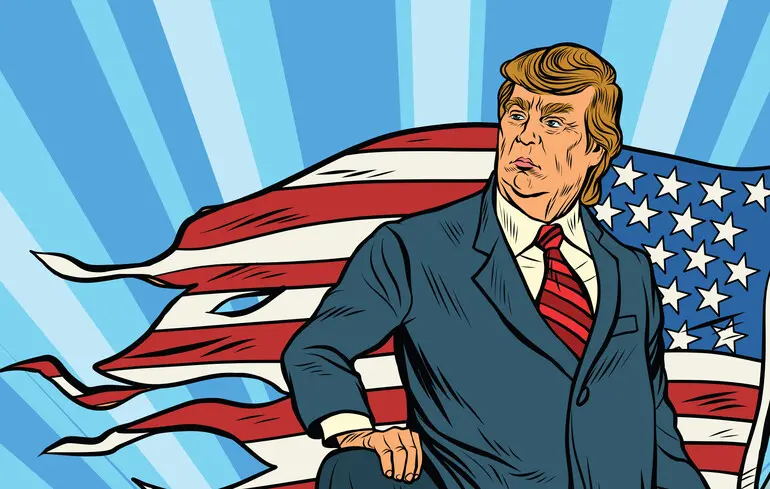
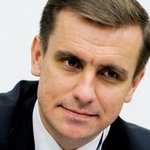
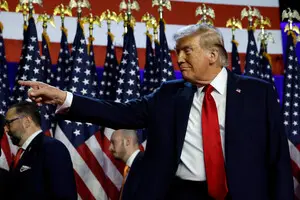
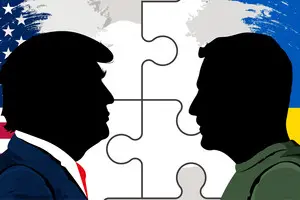
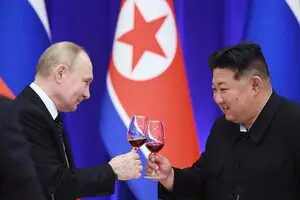
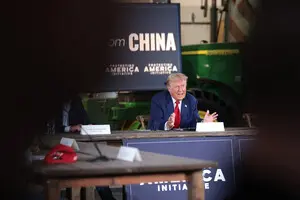
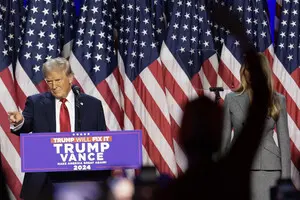

 Login with Google
Login with Google